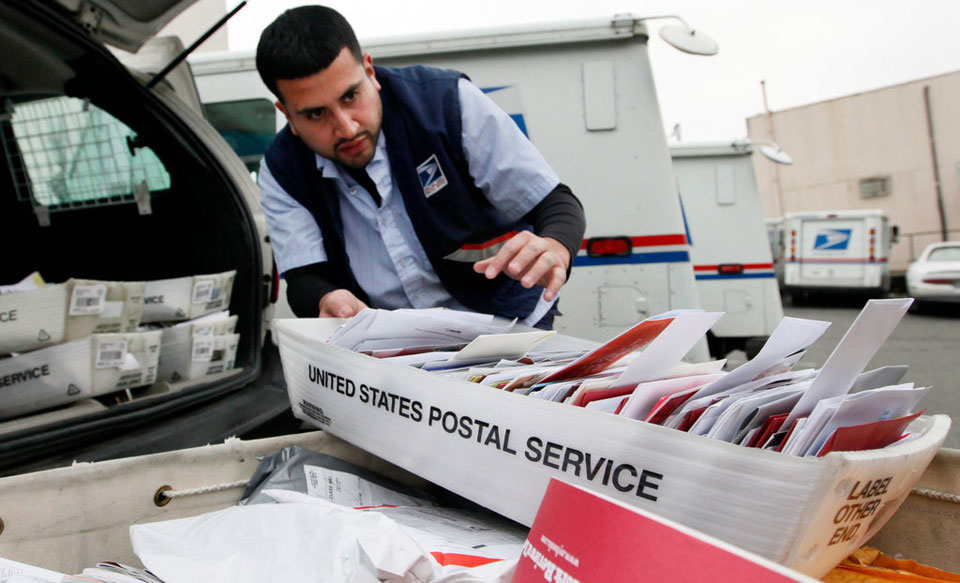
WASHINGTON—National Association of Letter Carriers union President Fredric Rolando predicted “especially difficult” negotiations with the U.S. Postal Service as talks on a new contract between the two sides opened in late June.
Rolando, in the third contract bargaining of his 15-year tenure as head of one of USPS’s two largest unions, hopes to reach a new pact to replace the current one, which ends Sept. 20. But NALC is willing to go to binding arbitration if necessary, he warned Postmaster General Megan Brennan.
“As always, we will seek to preserve and improve the standard of living for city Letter Carriers,” Rolando said in the June 26 session. “We aim to move forward, not backward. There will be no concessions offered or given. But we will work diligently and professionally to find common ground and mutual progress.”
The Letter Carriers are one of several unions talking with USPS management over new contracts. Management recently reached a tentative agreement with a much smaller union, the Rural Letter Carriers.
The pacts with NALC and the Postal Workers (APWU) are the two largest USPS has, and historically the most-contentious. Those two unions represent the overwhelming majority of USPS workers. Each union has around 200,000 members.
Hanging over all the bargaining is the constant red ink USPS has suffered ever since a GOP-run Congress imposed and Republican President George W. Bush signed a 2006 postal reorganization act.
That measure imposed an annual $5 billion cost on USPS to pre-fund future retirees’ health care costs. Without it, USPS’s own figures show, the service would turn a slight profit every year or break even, even during the Great Recession. With that cost, USPS is bleeding money.
Brennan’s predecessor Pat Donahoe, a business executive, tried to “solve” that through massive post office closures and replacing full-timers who had benefits with part-timers with no benefits. He also did not lobby for ending that $5 billion cost, as the unions and Brennan do.
Donahoe also eliminated many regional mail processing plants (thus slowing service even within major cities), tried to kill Saturday delivery, and advocated firing tens of thousands of workers and letting even more go by attrition. Most USPS workers are women, people of color, or both.
Donahoe also tried a scheme to get non-union Staples workers to sell stamps, but the unions, led by APWU, won a court ruling that such outsourcing violated their contracts.
NALC “deeply opposes” Brennan’s similar 10-year business plan, Rolando said. “We view it as a huge step backwards” by a decade. “Donahoe unveiled a very similar plan that failed in Congress and resulted in a period of angry and unproductive labor relations.”
Yet another threat looming over the talks, though Rolando did not mention it, is recommendations late last year from a “postal reform commission” appointed by anti-worker President Donald Trump.
Over objections from both unions and postal customers, the panel of three top Trump regime cabinet officials brusquely recommended privatizing the Postal Service, cutting out 6-day and door-to-door delivery, firing workers, and abrogating or renegotiating union contracts.
“Adding to the difficulty” in the current bargaining round “is our failure to make progress in recent years on the Postal Service’s often toxic workplace culture,” Rolando said. “Speaking bluntly, it has become clear to us management does not choose to acknowledge, much less address, this problem, which festers and persists in too many post offices across the country.”
“We are committed to work with you in good faith and to do whatever it takes to achieve a mutually beneficial contract,” he concluded. “But we are equally committed to fight for such a contract in interest arbitration, if necessary.”

MOST POPULAR TODAY

High Court essentially bans demonstrations, freedom of assembly in Deep South

Zionist organizations leading campaign to stop ceasefire resolutions in D.C. area

U.S. imperialism’s ‘ironclad’ support for Israel increases fascist danger at home


UN warns that Israel is still blocking humanitarian aid to Gaza






Comments